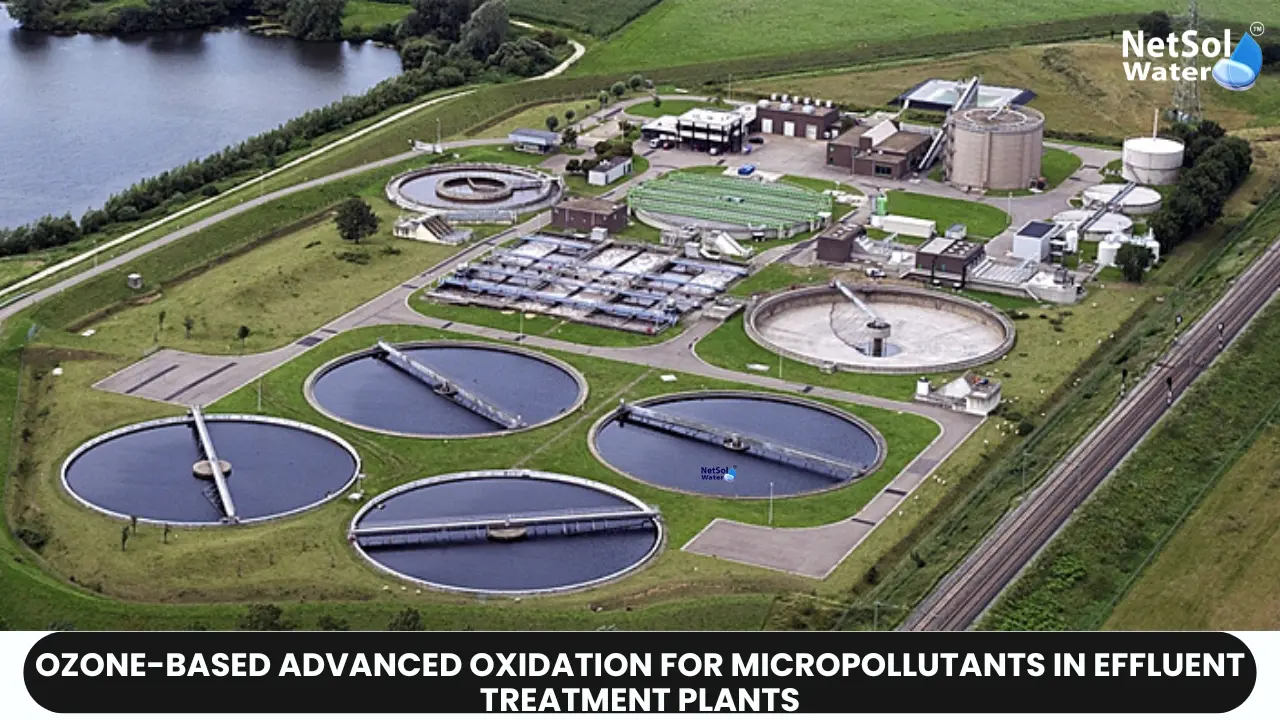Ozone-Based Advanced Oxidation for Micropollutants in Effluent Treatment Plants
Micropollutants, such as pharmaceuticals, personal care products, and industrial chemicals, are becoming a bigger worry in the water industry because they can harm the environment and people's health. Regular ways of cleaning wastewater usually aren't good enough to get rid of these tiny pollutants completely. This means even after treatment; they can still be in the water that's released back into rivers or lakes. To deal with this problem, advanced oxidation processes (AOPs) have come into play, especially ones that use ozone. These methods are really good at removing tiny pollutants from wastewater treatment plants.
Understanding Micropollutants
Micropollutants are a mix of different organic and inorganic substances found in water at very low levels, usually measured in tiny amounts like nanograms or micrograms per liter. They come from different places, like household items, medicines, factories, and farming runoff. Even though they're in small amounts, micropollutants can still cause big problems for water life and people's health. They can build up in living things and cause hormonal issues or other harmful effects.
Limitations of Conventional Treatment Processes
Conventional wastewater treatment processes, such as primary sedimentation, activated sludge systems, and secondary clarification, are designed primarily for the removal of suspended solids, organic matter, and nutrients. However, these processes are often ineffective in removing micropollutants due to their recalcitrant nature and low concentrations. As a result, many micropollutants can pass through conventional treatment plants and be discharged into receiving water bodies, posing potential risks to aquatic life and human health.
Advanced Oxidation Processes (AOPs)
Advanced oxidation processes (AOPs) are a set of chemical treatment methods that create very reactive substances, like hydroxyl radicals (•OH), to break down and convert organic and inorganic pollutants. These processes are really good at oxidizing and changing micropollutants into less harmful or easier-to-break-down forms, which makes them useful for treating wastewater.
Ozone-Based Advanced Oxidation
Among different advanced oxidation processes (AOPs), ozone-based systems have become really popular for removing micropollutants in effluent treatment plants. Ozone (O3) is strong at oxidizing, so it can either directly react with certain organic compounds or create hydroxyl radicals. It does this by teaming up with hydrogen peroxide (H2O2) or getting hit by ultraviolet (UV) radiation.
The following are common ozone-based AOPs used for micropollutant removal:
1. Ozonation (O3): In this process, ozone is directly introduced into the effluent, where it reacts with organic compounds through direct oxidation or the formation of hydroxyl radicals.
2. Ozone/Hydrogen Peroxide (O3/H2O2): This AOP involves the combination of ozone and hydrogen peroxide, which enhances the generation of hydroxyl radicals and improves the oxidation efficiency for micropollutant degradation.
3. Ozone/UV (O3/UV): In this process, ozone and UV radiation are combined, promoting the photolytic decomposition of ozone and generating hydroxyl radicals for enhanced oxidation of micropollutants.
Advantages of Ozone-Based AOPs
Ozone-based AOPs offer several advantages for micropollutant removal in effluent treatment plants:
1. Effective Degradation: Ozone and hydroxyl radicals are highly reactive oxidizing species capable of degrading a wide range of micropollutants, including pharmaceuticals, personal care products, and industrial chemicals.
2. Minimal Byproduct Formation: Unlike some chemical oxidation processes, ozone-based AOPs generally produce fewer and less harmful byproducts, minimizing the potential for secondary pollution.
3. Compatibility with Existing Treatment Processes: Ozone-based AOPs can be integrated into existing treatment plants as a tertiary treatment step, making them suitable for retrofitting or upgrading existing facilities.
4. Operational Flexibility: Ozone-based AOPs can be tailored to meet specific treatment requirements by adjusting parameters such as ozone dosage, contact time, and the addition of catalysts or UV radiation.
5. Environmental Compatibility: Ozone is a strong oxidant that decomposes rapidly, leaving no residual oxidants in the treated effluent, minimizing potential environmental impacts.
Challenges and Considerations
While ozone-based advanced oxidation processes (AOPs) are effective at removing micropollutants, there are several challenges and factors to consider:
Fouling and Scaling: Build-up of biofilms, deposits, or scale on equipment surfaces can reduce the efficiency of ozone transfer and UV light penetration. This requires regular cleaning and maintenance.
Energy Consumption: Generating ozone and using UV radiation can use a lot of energy, which might increase operational costs.
Byproduct Formation: Although usually minimal, some micropollutants may create unwanted byproducts during ozonation. This needs careful monitoring and control.
Operational Expertise: Running ozone-based AOPs properly needs specific knowledge and trained staff to make sure they work well and safely.
Conclusion
Using ozone-based advanced oxidation processes (AOPs) is a great way to get rid of tiny pollutants in effluent treatment plants. By using the strong oxidizing power of ozone and hydroxyl radicals, these processes can break down and get rid of lots of different organic and inorganic pollutants. This helps stop them from getting into rivers or lakes. Even though there are challenges like fouling, using a lot of energy, and making byproducts, ozone-based AOPs are still very useful for making effluent cleaner and keeping water life safe from tiny pollutants.
Do you need an advice or assistance on selecting the best water and waste water treatment unit? We have solutions for all your problems!
Let us now your problem, our experts will make sure that it goes away.
For an assistance or related query,
Call on +91-965-060-8473
Or write us at enquiry@netsolwater.com



